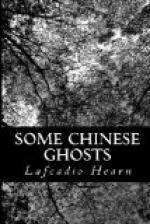“THREE COUNCILLORS.”—Six stars of the Great-Bear constellation ([Greek: ik—lm—nx]), as apparently arranged in pairs, are thus called by the Chinese astrologers and mythologists. The three couples are further distinguished as the Superior Councillor, Middle Councillor, and Inferior Councillor; and, together with the Genius of the Northern Heaven, form a celestial tribunal, presiding over the duration of human life, and deciding the course of mortal destiny. (Note by Stanislas Julien in “Le Livre des Recompenses et des Peines.”)
TIEN-HIA.—Literally, “Under-Heaven,” or “Beneath-the-Sky,”—one of the most ancient of those many names given by the Chinese to China. The name “China” itself is never applied by the Black-haired Race to their own country, and is supposed to have had its origin in the fame of the first Tsin dynasty, whose founder, Tsin Chi-Houang-ti, built the Great, or “Myriad-Mile,” Wall, twenty-two and a half degrees of latitude in length ... See Williams regarding occurrence of the name “China” in Sanscrit literature.
TSIEN.—The well-known Chinese copper coin, with a square hole in the middle for stringing, is thus named. According to quality of metal it takes from 900 to 1,800 tsien to make one silver dollar.
TSING-JIN.—“Men of Tsing.” From very ancient times the Chinese have been wont to call themselves by the names of their famous dynasties,—Han-jin, “the men of Han”; Thang-jin, “the men of Thang,” etc. Ta Tsing Kwoh ("Great Pure Kingdom”) is the name given by the present dynasty to China,—according to which the people might call themselves Tsing-jin, or “men of Tsing.” Williams, however, remarks that they will not yet accept the appellation.
VERSES (CHINESE).—The verses preceding “The Legend of Tchi-Niu” afford some remarkable examples of Chinese onomatopoeia. They occur in the sixth strophe of Mien-mien, which is the third chant of the first section of Ta-ya, the Third Book of the Chi-King.(See G. Pauthier’s French version.) Dr. Legge translates the strophe thus:—
... Crowds brought the earth in baskets; they threw it with shouts into the frames; they beat it with responsive blows; they pared the walls repeatedly till they sounded strong.—Sacred Books of the East; Vol. III., The She-King, p. 384.
Pauthier translates the verses somewhat differently; preserving the onomatopoeia in three of the lines. Houng-houng are the sounds heard in the timber-yards where the wood is being measured; from the workshops of the builders respond the sounds of tong-tong; and the solid walls, when fully finished off, give out the sound of ping-ping.




